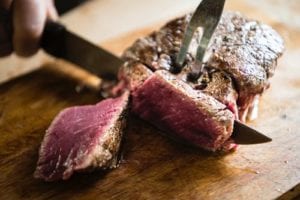Written by Joyce Smith, BS. A one-month diet of red meat but not white meat or no-meat, significantly increased blood and urine levels of TMAO in the study participants.
 Cleveland Clinic researchers discovered a link between carnitine ingestion, gut microbiota metabolism and cardiovascular disease (CVD) risk. They demonstrated how and why regular consumption of red meat may increase the risk of heart attack, and defined the contributing role of gut bacteria. The research builds on their 2013 work that demonstrated how red meat, high in L-carnitine, choline and lecithin, when ingested, is converted to TMA and further metabolized to TMAO (trimethylamine N-oxide), can contribute to the development of CVD, heart attack and stroke. In a 2014 study, the authors elaborated on γ–butyrobetaine (yBB), a pro-atherogenic intermediate in the gut microbial metabolism of L-carnitine to TMA/TMAO, and clarified that the conversion of L-carnitine to TMA/TMAO, and not yBB itself directly, is associated with increased atherosclerosis.
Cleveland Clinic researchers discovered a link between carnitine ingestion, gut microbiota metabolism and cardiovascular disease (CVD) risk. They demonstrated how and why regular consumption of red meat may increase the risk of heart attack, and defined the contributing role of gut bacteria. The research builds on their 2013 work that demonstrated how red meat, high in L-carnitine, choline and lecithin, when ingested, is converted to TMA and further metabolized to TMAO (trimethylamine N-oxide), can contribute to the development of CVD, heart attack and stroke. In a 2014 study, the authors elaborated on γ–butyrobetaine (yBB), a pro-atherogenic intermediate in the gut microbial metabolism of L-carnitine to TMA/TMAO, and clarified that the conversion of L-carnitine to TMA/TMAO, and not yBB itself directly, is associated with increased atherosclerosis.
In their 2018 dietary intervention study, the same authors 3 found that a diet rich in red meat, as the primary protein source, significantly increases circulating TMAO levels when compared to diets with white meat or no meat as the protein source. Volunteers (N= 113) were enrolled in a randomized 2-arm (high- or low-saturated fat) crossover design study. Participants within each arm were given three one-month long isocaloric diets of either red, white, or no meat (with a washout period between each). At the end of each one-month diet period, TMAO and other trimethylamine (TMA) related metabolites were quantified. A random subset (N= 13) of participants also participated in heavy isotope tracer studies. Participants on the red meat diet consumed the equivalent of an 8 oz. steak daily, or two quarter-pound beef patties.
After one month, the meat diet, but not the white meat or non-meat diets, significantly increased TMAO levels in both plasma and urine (each >two-fold; P < 0.0001) of participants. However, the TMAO increases were reversible and dropped significantly when the participants discontinued their red meat diet and switched to the white meat or no meat diet for another month. Eating red meat also impacted the effectiveness of the kidneys to expel TMAO and significantly reduced fractional renal excretion of TMAO (P < 0.05). However, the fractional renal excretion of carnitine, and two alternative gut microbiota-generated metabolites of carnitine, (c-butyrobetaine and crotonobetaine) were increased (P < 0.05).
This research demonstrated that chronic red meat consumption increased the production of TMAO by gut microbes and reduced the kidneys’ ability to expel it. Both TMAO’s increased production and reduced renal excretion, caused by the red meat diet, contribute to its elevated levels and to the development of atherosclerosis and heart disease.
Study limitations include a lack of controlled blood collection times and only two blood and urine collections per diet arm; however, it does provide some evidence-based results regarding dietary changes that can effectively reduce TMA/TMAO levels.
Source: Wang, Zoning, Nathalie Bergeron, Bruce S. Levisohn, Xining S. Li, Sally Chiu, Xin Jian, Robert A. Keith et al. “Impact of chronic dietary red meat, white meat, or non-meat protein on trimethylamine N-oxide metabolism and renal excretion in healthy men and women.” European heart journal 40, no. 7 (2018): 583-594.
© The Author(s) 2018. European Society of Cardiology. All Rights Reserved.
Posted June 19, 2019.
Joyce Smith, BS, is a degreed laboratory technologist. She received her bachelor of arts with a major in Chemistry and a minor in Biology from the University of Saskatchewan and her internship through the University of Saskatchewan College of Medicine and the Royal University Hospital in Saskatoon, Saskatchewan. She currently resides in Bloomingdale, IL.
References:
- Koeth RA, Wang Z, Levison BS, et al. Intestinal microbiota metabolism of L-carnitine, a nutrient in red meat, promotes atherosclerosis. Nat Med. 2013;19(5):576-585.
- Koeth RA, Levison BS, Culley MK, et al. gamma-Butyrobetaine is a proatherogenic intermediate in gut microbial metabolism of L-carnitine to TMAO. Cell Metab. 2014;20(5):799-812.
- Wang Z, Bergeron N, Levison BS, et al. Impact of chronic dietary red meat, white meat, or non-meat protein on trimethylamine N-oxide metabolism and renal excretion in healthy men and women. Eur Heart J. 2019;40(7):583-594.
